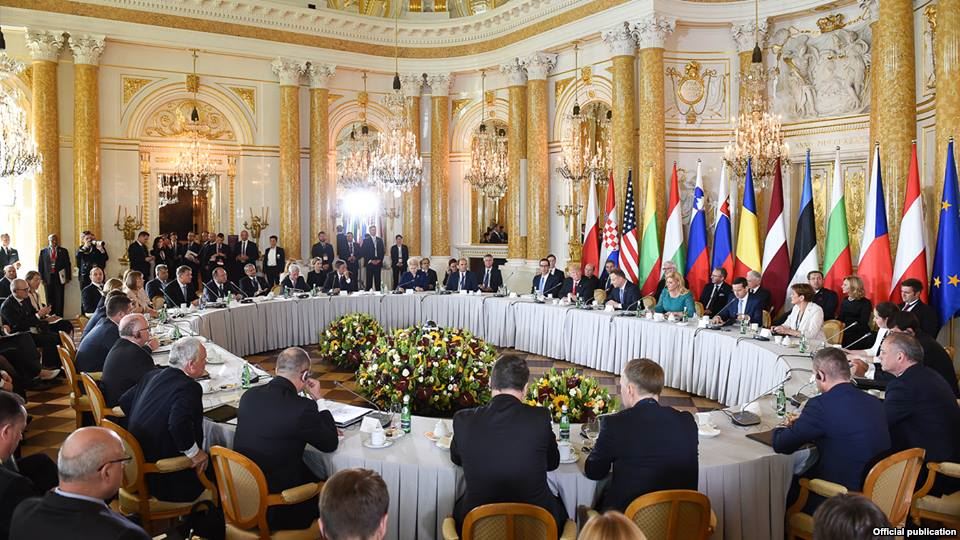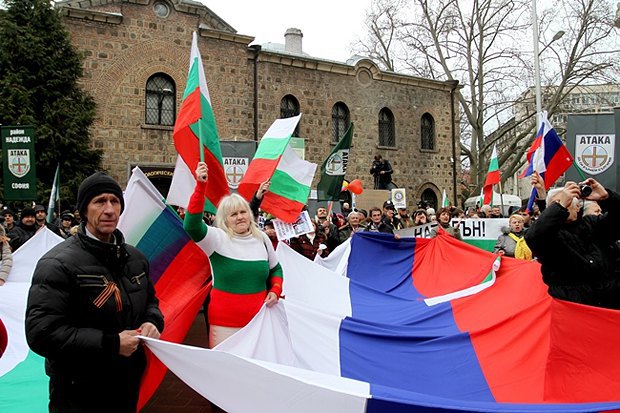During an official visit to Warsaw in early October, Bulgarian President Rumen Radev called to lift EU sanctions against Russia, which were imposed after Russia annexed Crimea and unleashed a war in eastern Ukraine.
The Russian Institute for Strategic Studies (RISI) under the Presidential Administration (formerly subordinated to the Foreign Intelligence Service) immediately responded to the initiative of the Bulgarian president. An article appeared on its website about disagreements on the Russian issue and its risks for destroying the “Polish-Bulgarian friendship” and even “calls into question the future of the Intermarium, which the Polish president Andrzej Duda has ambitions to become a leader of.”
RISI’s analysts noted that the idea of creating the Intermarium, an informal union which unites 12 Eastern European states for lobbying its agenda in the EU, “is of paramount importance” for the president of Poland. At the same time, the Kremlin authors wrote that it would be difficult to implement this idea in Warsaw, primarily because of “the significant disagreements the bloc’s participants have regarding Russia” – simply speaking, because Poland refuses to solidify with the pro-Russian stance of Rumen Radev, Victor Orban (Prime Minister of Hungary) and Milos Zeman (President of the Czech Republic).

Bulgarian political commentator Georgy Dimitrov believes that RISI's coverage of the topic stated by Radev is no accident – after all, RISI was the first foreign organization that Radev met
with after being elected as president.
“Radev’s candidacy was nominated for elections in the framework of a game led by most of Bulgaria’s new political elites, headed by Prime Minister Boyko Borisov and most parliamentarians from the socialist and nationalist parties. Even before the elections, all the key posts in our country, including Prime Minister Boyko Borisov, were somehow connected with the former Communist Party and the KDS – the Bulgarian KGB. In result, the efforts directed by Borisov led to the nomination of two key pro-Russian candidates: one from the ruling party, and the other one from the socialists (Mr. Radev, who eventually became the winner). And I am sure that this was done at the request of Russian President Vladimir Putin,” Georgi Dimitrov said.
Even before the elections in Bulgaria, Dimitrov had noted that Radaev singled out good relations with Russia as a priority – he personally visited Moscow and met with people close to President Putin.
In the RISI article, none of these visits or previous ties were mentioned. The authors only noted that on the issue of anti-Russian sanctions, the Bulgarian president “has no disagreements with Prime Minister Boyko Borisov.”
A year ago, former RISI director Leonid Reshetnikov openly called upon Radaev and Borisov “to clean up the current elites from the Euro-Atlantic factor – or the 'foam' of the Bulgarian nation,” suggesting that there is more substance to the Bulgarian nation behind the veneer of a Euro-Altantic identity.
In the opinion of the expert Georgy Dimitrov, in addition to RISI, Borisov maintained other ties with Russian Special Forces.
“In 2006, he boasted that he was the only foreign guest of the FSB in Moscow to celebrate the anniversary of Vympel Special Forces. Recently he noted that the Soviet KGB is 'an organization from which many specialists could learn a lot,' while Russian Foreign Minister Sergei Lavrov is 'the greatest diplomat in the world,'” the expert notes.
The Bulgarian commentator states that in the two years before the election, Radev was a commander of the Bulgarian Air Force and contributed to the delay in the rearmament of Bulgaria’s air forces by Western-made aircraft.
“He insisted for the repairs of several engines of Russian production for the Bulgarian MiG-29 fighters to be carried out at the manufacturer’s factories, and not in the NATO allied countries, for example, like Poland. Many believe that Radev is connected with Russia’s military industry. At least the last three commanders of the Bulgarian Air Force after retiring have linked their careers with the Socialist Party. In their new positions – political or otherwise – they tend to communicate closely with Moscow on the issues of the Bulgarian armed forces, armament or politics,” Dimitrov said.
At the same time, back in October 2016, Radev repeated his point that Western sanctions against Russia should be abolished and that annexed Crimea has actually become the territory of Russia. According to him, Ukraine should be cautious with Russia, otherwise, it risks losing all of its eastern territories.
“The day after his victory in the first round of the elections, he confirmed his position that 'the Russian flag flies over Crimea and we cannot turn a blind eye to reality.' Five days after that, Russian media reported that Borisov’s government had signed a contract with Russian MiG-29 manufacturers to supply ten engines for its fighters. At the same time, for many years NATO has called on the Bulgarian government to acquire new Western aircraft in order to put an end to its dependence on Russia, but the government has consistently refused under various pretexts," Georgy Dimitrov said.
RISI recognizes that Rumen Radev is forced to maneuver between Moscow and the West. In the National Security Report of the Republic of Bulgaria for 2016, Russia’s actions are viewed as “a source of regional instability” and a threat to “the main goal – a single, free and peaceful Europe.” And Radev himself repeatedly stated his solidarity with the European Union and NATO membership; subsequently, his policy towards Russia is of a dual nature.
Read more:
- Russian networks in Bulgaria
- Bulgaria - targeted by Russian criminals and spies
- Does Bulgaria's new President consider Crimea Russian?
- "Russophiles" aim to steer Bulgaria away from NATO





